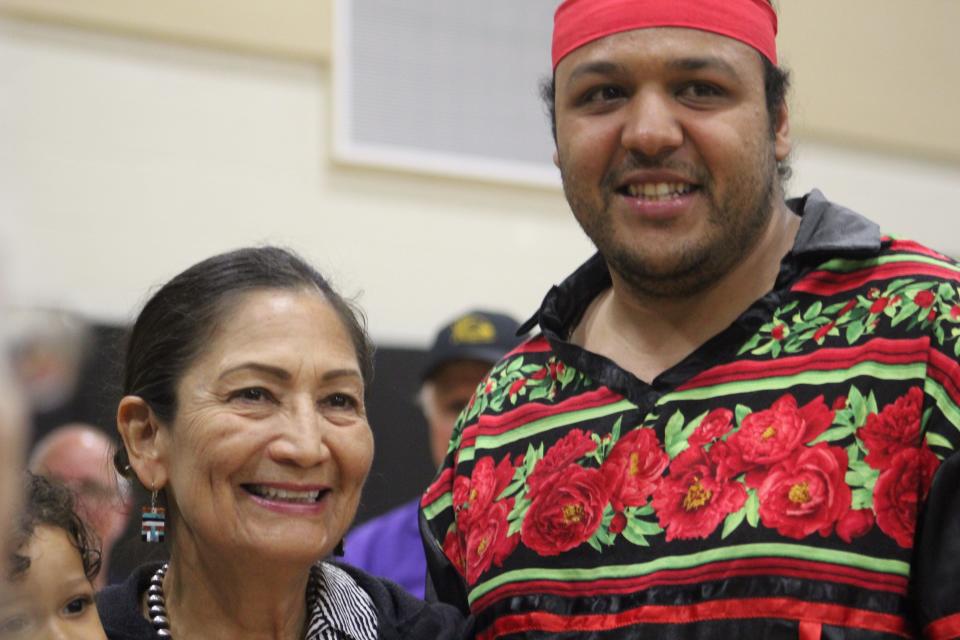New court decision puts Mashpee Wampanoag Tribe in control. Here's what to know.
In an opinion released Tuesday, the U.S. First Circuit Court of Appeals in Boston ruled that the U.S. Department of the Interior can hold two parcels of land in Taunton and Mashpee in trust for the Mashpee Wampanoag Tribe.
The decision has been a long time coming, said Brian Weeden, chairman of the Mashpee Wampanoag Tribe.
"The priority has and always will be about the land," he said Wednesday by phone. "While we celebrate this victory, we must be mindful of the battles to come as we continue to work on land back initiatives with the commonwealth, federal government, and other organizations."
The 35-page decision was written by a panel of three judges: Judge Lara Montecalvo, Judge Sandra Lynch, and Judge Julie Rikelman.
David and Michelle Littlefield and 22 others were appealing a 2021 U.S. District Court decision that asserted that the Department of the Interior Bureau of Indian Affairs could hold 321 acres in trust for the Mashpee Wampanoag Tribe.

Throughout the case, the appellants made claims that the tribe didn't fit the federal definition of "Indian," under the 1934 Indian Reorganization Act. According to federal guidelines, a tribe needs to be defined as "Indians" in order to qualify to hold land in trust, according to the decision.
The decision, said Heather Sibbison, an attorney for the tribe, was well written.
"This is an important decision for all federally recognized tribes," she said by phone Wednesday.
Can the Littlefields and other appellants appeal?
The appellants in the case can move forward with what's called an "unbanked appeal," said Sibbison, where they can try to convince judges within the First Circuit Court of Appeals that Montecalvo, Lynch, and Rikelman got it wrong. Or they can petition to the U.S. Supreme Court for review.
“The Littlefields can try to get an appeal. And they might. But both options are discretionary," she said. "It’s not like when they lost in District Court, and they had a right to appeal to the Circuit Court."
Case has been heard in court four times since 2015
For the Department of the Interior to authorize land into trust and create a reservation for the Mashpee Wampanoag Tribe, it must comply with the Indian Reorganization Act, said Sibbison. There are three definitions of the word "Indian" associated with the Indian Reorganization Act, she said.The definition of “Indian” under the Indian Reorganization Act is: "(1) all persons of Indian descent who are members of any recognized Indian tribe now under Federal jurisdiction, and (2) all persons who are descendants of such members who were, on June 1, 1934, residing within the present boundaries of any Indian reservation, and shall further include (3) all other persons of one-half or more Indian blood," according to the department.
After the Department of Interior under the Obama administration put the land into trust for the tribe in 2015, the Littlefields challenged the way the Department of the Interior defined the word "Indian" in reference to the Mashpee Wampanoag Tribe.
There were court decisions in 2015, 2018, and 2021, said Sibbison. While the courts sided with the tribe in 2015 and 2021, in 2018 the Trump administration rejected the Department of the Interior's interpretation of the word "Indian."
"Then we sued here in D.C., and the court agreed with the tribe and ordered the Department of Interior to do it again," she said.
The decision was vacated by the U.S. District Court in the District of Columbia, which found it to be unlawful, and turned the matter to the agency.
The U.S. District Court ruled that the tribe satisfied the federal definition of "Indian," as required to qualify the tribe for trust lands. And on Feb. 10, Judge Angel Kelley issued a 31-page decision affirming a December 2021 decision by the Secretary of the Interior to confirm the Mashpee Wampanoag Tribe's right to the reservation land.
Justice has been delayed, says the tribe's attorney
Sibbison has been fighting in court on behalf of the tribe since roughly 2015, she said. While the victory of the most recent court case is sweet, she said, justice has been delayed for far too long. It's gratifying, she said, to see both the Department of the Interior and the courts properly applying the law.
“These delays have interfered with the tribe's ability to provide housing, language instruction, and language-specific education," she said. "This has done a lot of damage for people who have already suffered a lot of damage."
Rachael Devaney writes about community and culture. Reach her at rdevaney@capecodonline.com. Follow her on Twitter: @RachaelDevaney.
Get the Cape Cod news that matters delivered to your inbox. Sign up for our free newsletters.
This article originally appeared on Cape Cod Times: Court ruling allows land held in trust for Mashpee Wampanoag Tribe
